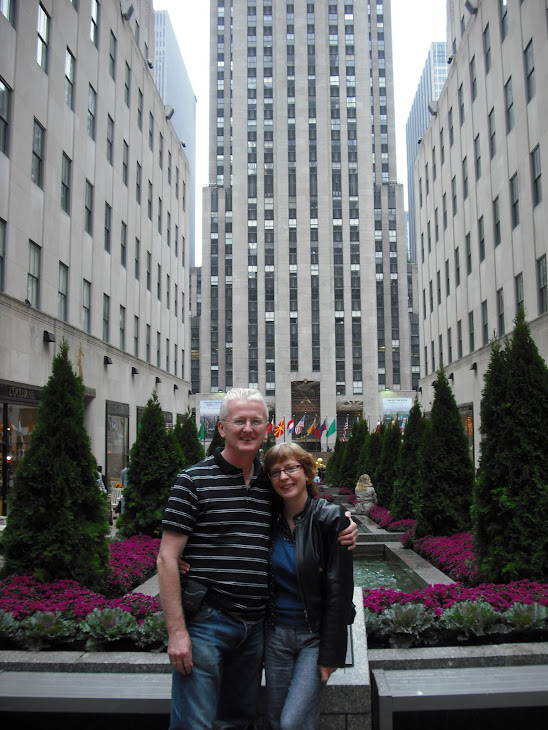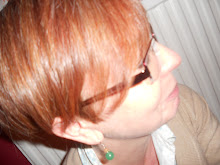It's an anniversary today. Two years now since the diagnosis. That's pretty good. It's reason enough to celebrate. He's just beginning to need the wheelchair, he's still working, still able to enjoy food and drink. We're lucky I guess. I had a look at my post of a year ago. Roch was using the two sticks, and getting used to the rollator. It was just before our Venice trip. There's no doubt that the monkey is getting stronger but we're not done yet, not by a long shot.
Tuesday saw our first visit to the Royal Brompton and Harefield Hospital. One of the Neurologists at the West Middlesex referred Roch there for baseline assessment of his breathing capability. On arrival, we had some difficulty locating the disabled spots. Roch had booked one in advance as advised. When we eventually found them, we were dismayed by the very narrow side street in which they were situated. It looked so unlikely that we weren't sure we were in the right place. But no, we had arrived and I duly secured our parking permit from the 'Transport' office, having been directed there by a rather dour receptionist. Back out to the car and organised the wheelchair - very narrow pathway round the corner to the ramped entrance (our Richmond Occupational Therapist would never have approved the gradient!).
We were bound for Lind Ward on the fourth floor. When we got there it was very busy and the corridor (where most people were waiting to be seen) was pretty full. I really had no idea what to expect and at first it felt very alien and depressing. We didn't have to wait for long, however, before a nurse called us into the ward and there they did the breathing tests. Two nurses applauded Roch's efforts as he blew twice into a tube and the results of his lung capacity were recorded on a graph. Then we were sent off to wait for a blood test, after which, we were told, the consultant would see him.
So we went back to the corridor to wait. The afternoon did have its lighter moments, I have to admit. You meet people in a hospital waiting area. Yesterday we met 'Nanny Biscuit'. That's what her grandchildren call her. I think she's what's called 'a bit of a character' and she likes to talk. We encountered Nanny in the corridor about midway through our visit and would you believe it, we three were the last members of the public in the department! If a kindly nurse going off duty hadn't patiently held the lift door open for us as as we gingerly edged our way away, we'd still be there, listening to Nanny Biscuit!
Roch had been given the option of having blood taken from either his wrist or his ear. He didn't fancy the idea of being bled from his ear, so he said wrist but we had been waiting a while when the consultant appeared and explained that there would be someone available sooner to take it from the ear. So from the ear it was. Ger, my lovely sister-in-law has since explained that they needed arterial blood to measure the oxygen levels and she also said that it's really painful when taken from the wrist.
By the time we were called for blood to be done, Roch was the very last patient to be seen. But in a way, this made it easier. The department was almost deserted, the staff were delighted because they were nearly at the end of what must have been a very long (and I suspect very trying) day and it made it so much simpler to negotiate the corridor with the wheelchair. A very cheery male nurse smeared some cream on the ear (advising us that this was to bring the blood to the surface and not to dull the pain) and then, using a small razor, made a slit in the ear lobe (ouch!). Then he expertly directed the ever-increasing droplets into a thin tube. Roch then had a HUGE bandage attached to said earlobe with an enormous blue plastic clip. Oxygen levels slightly below normal but nothing to worry about and carbon dioxide levels are normal.
We were then brought straight in to see the Consultant, Professor Polkey and here we hit pay-dirt, as they say. This is a man we can deal with. He knows what he's talking about and is not afraid to address end of life issues with us. He welcomed us, explaining that he would be with us on the path ahead. We were reassured by his obvious experience and expertise. He was matter of fact about what lies ahead and made it easy for us to talk about a very difficult subject. This is the man who will monitor Roch's breathing capability and assist when it becomes compromised. Much of our conversation was around how much assistance Roch might welcome and his honesty and direct approach was actually very comforting. Roch and I will go back in two months' time so that they can conduct a 'sleep study' to see if his breathing is being affected while he is sleeping. The graphs show that his lung capacity is actually still pretty good, which is reassuring.
Again, we have been lucky. Those of you who have been with us from the beginning may recall posts in which I speak highly of Professor Al-Chalabi, our Consultant Neurologist at King's College Hospital. Professor Polkey now joins him in our personal gallery of Consultants We Trust. It's important to have people you can put your faith in. These are the people who strangely enough, give us comfort. The people who offer some hope that the certain end of the uncertain path which lies ahead may yet be reached with dignity and respect and the absolute minimum of discomfort and suffering.
I forgive you, Royal Brompton, for your poxy parking space, your crowded corridor and your dour receptionist. Meeting Professor Polkey made up for it all.
Subscribe to:
Post Comments (Atom)


This post is an excellent narrative writing, quite engaging. It seemed like you two had a mini-Odyssey, starting with the parking, which was like navigating the Dardanelles, and entering the building akin to gaining safe passage. You encountered different people, involved blood and breath, both life forces, taking their roles. Nutty Nanny Oracle. Finally, you meet Dr. Polkey, who combines intelligence with kindness, and realistic talk.
ReplyDeleteMy wife had a sleep study about ten days ago. Now she has a CPAP machine. She has snored like a stevedore or dockworker for ten years, and I have been dealing with it with earplugs. I had to draw the line when she started breathing only three times a minute. I was scared about low oxygen levels. Two nights ago I saw her breathing while sleeping like a normal person. I was so grateful. Even though she has a Top Gun fighter pilot air mask! Several of her friends who have been on holiday with her before, agreed on the urgency (Just based on sound levels alone) as well as predicting that she will be even more of a super woman now that she will get a full knights rest from her prior air restrictiveness.
Like the Odyssey, I see you and Mayhem as modern-day heroes traversing on your journey. While the healthcare system can sometimes be Minoan labyrinth, the struggles make the successes all the more precious.
With gratitude,
L.A.